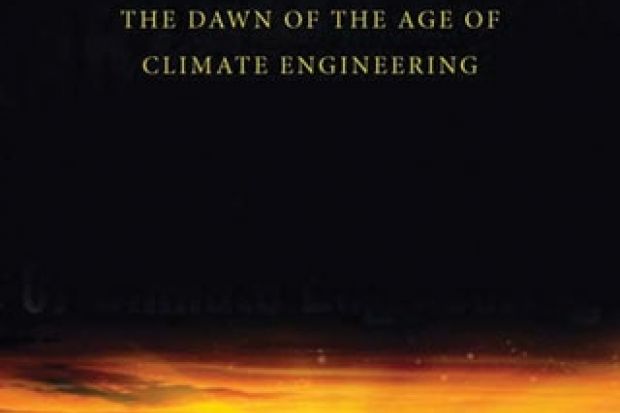Most activists and commentators feel glumly pessimistic because of the lack of progress in climate change negotiations. In the meantime, global carbon emissions continue and even rise, atmospheric carbon dioxide builds up, and deadlines for action go whooshing past unheeded. If we can’t agree a way to cut emissions and divide up the responsibility for doing so, then perhaps it is better to try to fix the problem directly by engineering the world. In this Plan B, we could, for example, spray gas high in the atmosphere to filter incoming sunlight or squirt water droplets to make the stratocumulus clouds that hang over huge sections of the oceans more reflective so that the sun’s rays are bounced back into space.
There is now quite a large body of literature on so-called geo- engineering, but Clive Hamilton’s book stands out because he emphasises that we are nearer than most of us realise to implementing climate engineering; we stand on the brink of appointing ourselves managers of the global climate. He is deeply troubled by this both because he thinks it a sad defeat for humankind to go for this option when Plan A is so much better, and because he reckons - given how badly we’ve overseen the environment to date - that we are likely to be pretty poor at managing Plan B.
Hamilton highlights how large corporations that dragged their feet in acknowledging the reality of climate change are suddenly keen to sign up to engineering solutions to a problem they used to deny
Earthmasters starts with a good overview of the main ideas for engineering solutions to the climate problem. Hamilton reviews proposals both for getting the carbon out of the atmosphere and for keeping the temperature down even without removing carbon. The technical coverage is good, although he does not always highlight the extent to which judgements about technical issues are inevitably entangled with philosophical and political commitments.
Hamilton, a philosopher by background, offers arguments that benefit in places from the steely analytical rigour of his discipline. He is, for example, clear on the moral hazard of developments in geo-engineering, noting that research in this area is “virtually certain to reduce incentives to pursue emission reductions”. He is also sharp on the folly of overconfident enthusiasts eager to take on the role of Earth-manager despite a limited understanding of the ecological complexity of planetary systems.
Elsewhere his arguments are less strong, less steely. For example, he is correct to point out that many possible geo-engineering interventions relate to bits of the planet that are not yet well regulated in legal terms: remote oceans or slices of the atmosphere. But he does not give enough attention to analysing possible legal structures and to thinking about how they could be implemented. Hamilton highlights how large corporations that dragged their feet in acknowledging the reality of climate change are suddenly keen to sign up to engineering solutions to a problem they used to deny. Their lack of logic comes through clearly, but there is much less detailed information on how firms, investors and innovators are responding to the multiple opportunities for geo- engineering projects. Furthermore, the large section that deals with the politics of climate-change denialism is familiar from his earlier work and does not engage entirely with the specifics of climate engineering.
In all, Hamilton has put together a smart, timely book. In places it has a philosophical detachment but overall it is more an activist’s work, a kind of soft polemic. I doubt that he will win over many of geo-engineering’s adherents because he gives his own arguments the benefit of the doubt rather more than theirs. It would be a good book for politicians to read ahead of voting on geo-engineering proposals, although sadly it ends without a compelling restatement of Plan A.
Earthmasters: The Dawn of the Age of Climate Engineering
By Clive Hamilton
Yale University Press, 288pp, £20.00
ISBN 9780300186673
Published 22 February 2013
Register to continue
Why register?
- Registration is free and only takes a moment
- Once registered, you can read 3 articles a month
- Sign up for our newsletter
Subscribe
Or subscribe for unlimited access to:
- Unlimited access to news, views, insights & reviews
- Digital editions
- Digital access to THE’s university and college rankings analysis
Already registered or a current subscriber? Login




